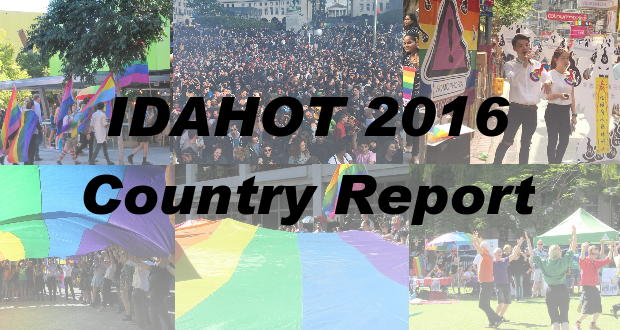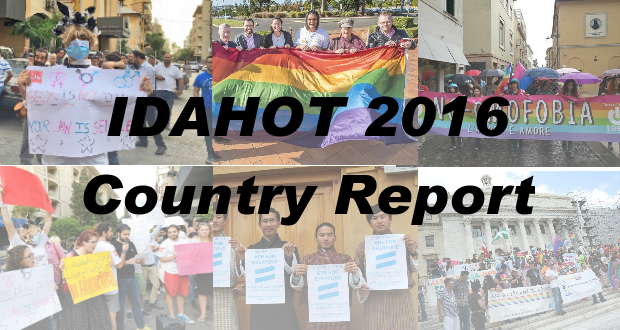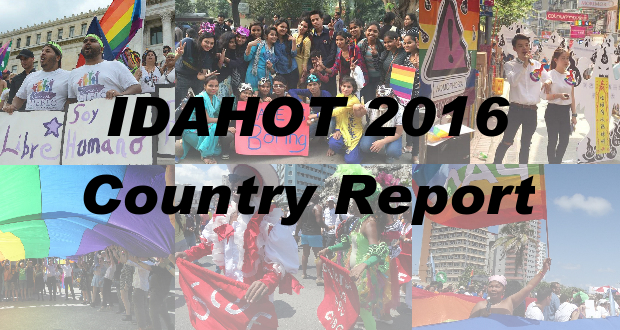Activity in Ukraine was this year smaller than in past IDAHOT celebrations. Increasing persecution in the last year has forced LGBT groups to be concerned more than ever for the safety of their group and supporters.
But despite the threat of violence and discrimination supporters this year managed to support IDAHOT with a wonderful online action. In an effort to draw attention to discrimination faced by the LGBT community campaigners from Gender Z created and shared an online video.
The video features members of the group and local LGBT community and hoped to challenge attitudes of the LGBT community, while also tackling negative stereotypes and attitudes. Watch the full video on youtube.
The video was also part of a small Rainbow Flashmob organized by campaigners in the city of Zaporzhia, which as well as drawing attention to the group, also provided a valuable outlet for LGBT young people in the area.
——
Five activists broke the silence over LGBT rights in Belarus on May 17, The International Day Against Homophobia, Transphobia and Biphobia (IDAHO), by handing out leaflets in support of equality and tolerance on the central streets of the nation’s capital and picketing at a US embassy over marriage equality legalization last year.
One of the participants, Aleksa Klimenka, stated that he came with his de-facto husband with whom he has lived together for seven years. The event was also officially supported by MSD-MH, a Belarusian social democratic youth organization, whose members also participated in it.
The activists were followed by six journalists and two observers from human rights organizations. Almost all of the passers that were willing to take leaflets reacted peacefully though the participants had a heated debate with an older woman who argued that “it is illogical to be gay”.
Aleksa Klimenka responded: “In 2012 my husband had to quit attending the university just before graduating because of the “ distribution” [in Belarus many university graduates are distributed for compulsory work for two years, often at remote destinations.] If he were my wife we could have been distributed together, but since we are nobodies in the eyes of the state, we could be separated for several years. He had to quit the university. As a result he has neither a higher education nor a job, and that then has become a major issue for us both”.
After handing out the leaflets three activists held a solidarity picket in front of US embassy in support of marriage equality achieved there nationwide last year. One of them stood with a rainbow flag, the second one held a placard with drawn US flag and inscription that reads “You lit the Soviet darkness for me and my husband”. The third protestor held a placard with a photo and a quote of a US federal judge John Heyburn who ruled Kentucky’s same-sex marriage ban unconstitutional.
Both actions were not permitted by the authorities and the exact time of the latter one was not published, though immediately after protestors came to US embassy, they were surrounded by nearly ten plain-clothed men who were watching and filming the picket. Surprisingly, neither they nor any police officers approached the activists. Perhaps the presence of the journalists and human rights defenders and the added fact that on the same day the US Department of State representatives had visited Minsk to discuss democracy and human rights also helped the protestors. Though recent developments in Belarus indicate that street protestors can be later fined up to $600 without even being approached by the police, as well as up to 15 days of jail time – the latter consequence was also frequently used until last summer.
These actions in support of LGBT rights are the first ones in Belarus since 2013, when the local LGBT activists experienced crackdown from the government, some of whom fled the country to seek asylum in the West. Protestors said that the previous picket in front of US embassy in Minsk was held in 2003 but now, at the time of so-called liberalization when Belarusian government relaxed repressions in order to please the West and make it lift the sanctions, they wanted to use such an opportunity to express their opinion.
—
More reports of the event, with photos:
In Russian http://news.tut.by/society/496704.html
In Belarusian http://spring96.org/be/news/83095



